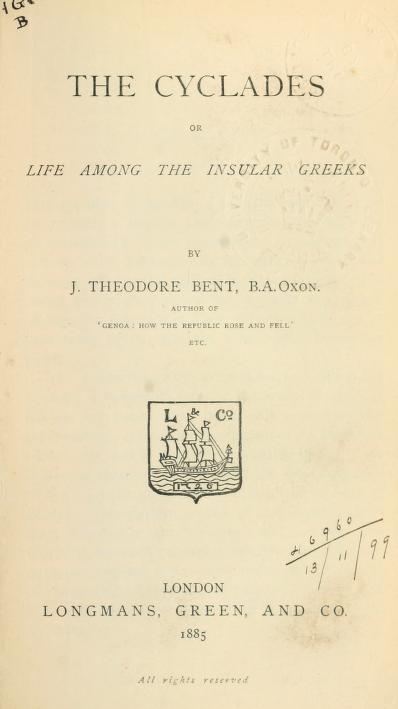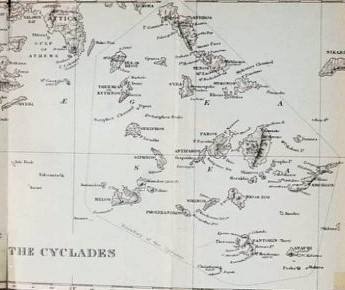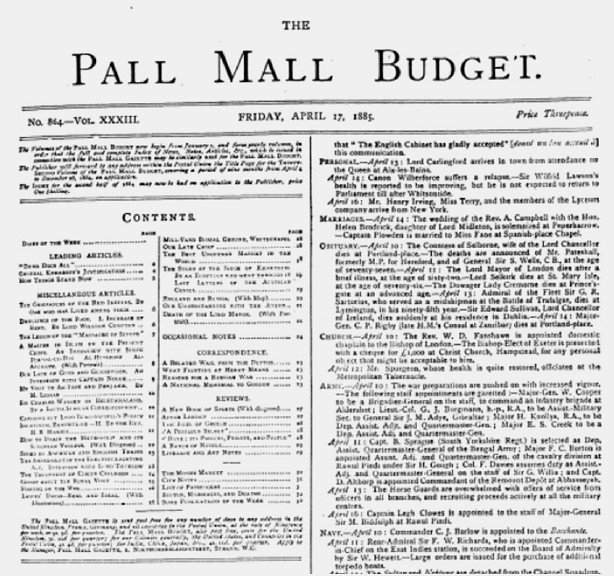The Isles of Greece*

“Though Mr. Bent is an Oxford man, he knows some Greek, and has managed somehow to retain or acquire a profound interest in things Hellenic. That is always something, for Greece is a country towards which, in spite of our education, we all possess somewhat of a filial affection: but Mr. Bent does more than this – he takes an active interest in the living Greeks, his ways and modes of thinking, largely tempered by the modern anthropological and sociological point of view, too often wholly wanting or absolutely repellent to the confirmed Hellenist. If there is one form of savant left on earth upon whose ears the echo of the sociological revolution falls dull and muffled, it is your old-fashioned classical scholar, hermetically sealed in his own sturdy with his grammar and his lexicon, his editions and manuscripts. For him, Lubbock and Tylor are not: the Folk-lore Society sings to him like a siren, all in vain: no savage myth rises vague upon his narrow horizon: no dim memory of forgotten barbarism shines faintly on him from the storied pages of Plato or Pausanias. His world begins with the First Olympiad: his history finishes with the death of Odoacer. Not of such as these is Mr. Bent. A folk-lorist to the backbone, eager to discover and compare while yet they survive the lingering relics of native Hellenic popular mythology, he has spent two winters hard at work among the almost unbroken ground of the Cyclades, and has finally recorded his net results for us in this pleasant, amusing, and instructive volume.

“[Bernhard] Schmidt had been beforehand with him, it is true, on the Greek mainland; but then, the Greek mainland is largely Albanian, and its folk-lore is largely tinctured with alien elements. The islands, on the other hand, have been always Greek, and, practically speaking, always free. So hither Mr. Bent went with his wife, in search of habits and manners, and dwelling among the people in their own hamlets, collected a goodly store of facts and fancies, which he knows how to detail for us with a cunning pen. At first he studied his human subjects with the aid of a dragoman; but as time went on, and as he began to acquire fluency in the language which we are all supposed to have learned at school, he went direct to the fountain head, and extorted from the not unwilling lips of demarchs and priests and hostesses and pretty Greek maidens innumerable tales of Fates and Nereids, of Boreas and St. Demetrius, of ancient god and Christian martyr, in the picturesque confusion of medieval Europe. The nymphs of the fountain take the place, among the Cyclades, of our northern fairies; Dionysus has got himself thinly Christianized as St. Dionysius; and Charon, properly baptised no doubt for the occasion, still ferries over orthodox Greeks to their last resting-place, as he used to do rightminded Pagans of old to the realms of Hades. Nowhere does the thin veneer of the new religion lie more lightly over the solid and enduring substructure of the old than among the Greek Islands. Essentially pagan still in all his underlying mythological conceptions, the insular Hellene remains a living relic of ages far earlier than even those of the Attic dramatists – he goes back in part to the most primitive stratum of European belief and philosophy. We could have wished that Mr. Bent had given us a little more of actual description of these beautiful and barren islands, but we recognize at the same time how much his book gains from its unique devotion to a difficult, elusive, and fascinating pursuit.

“Sometimes, indeed, as in the episode of the ardent collector waiting patiently at Myconos till somebody should die, and inquiring with sinister anxiety after the health of the various failing invalids, in order that he might be present at one of the death-wails which form the staple product and pride of the island – the eagerness of the folk-lorist becomes positively weird and gruesome in its intensity. A modern story-teller might improve upon the position by making the single-hearted inquirer poison his host so as to provide a victim for the wailing women in the interests of science. We present the hint gratuitously as a valuable property to Mr. Wilkie Collins. If we have repeated none of Mr. Bent’s own good stories, it is only in order that we may send our readers direct to his amusing pages in search of them at first hand. There is matter enough in this little volume to stock half a dozen ordinary bookmakers’ fat notebooks.”
* “The Cyclades.” By J. Theodore Bent. 12s. 6d. (London: Longmans.)
……………………..
Anonymous review of Bent’s The Cyclades; or Life Among the Insular Greeks, from the Pall Mall Budget – 17 April 1885, page 28.
Bent’s book was published on 28 February 1885.
